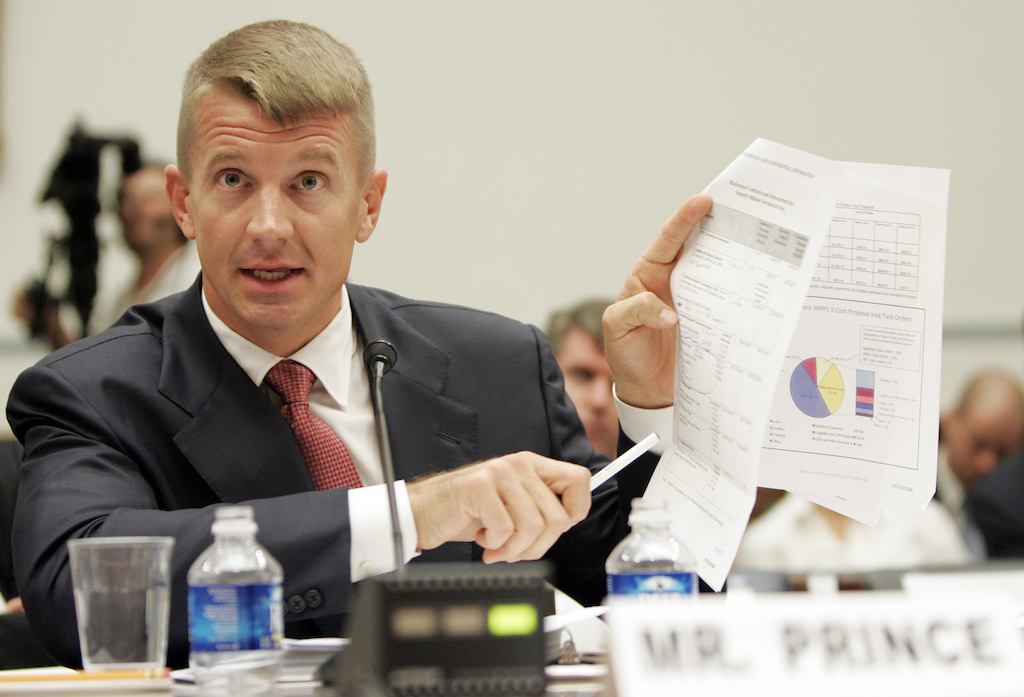Critic Calls N.Y. Times Op-Ed by Erik Prince an ‘Infomercial’
The Blackwater founder advocates privatizing the military in Afghanistan and compares his work to that of Elon Musk and SpaceX. Blackwater USA founder Erik Prince testifies on Capitol Hill in 2007 at a House hearing examining the mission and performance of his private military company in Iraq and Afghanistan. ("force protection" to clients in countriesSusan Walsh / AP)
Blackwater USA founder Erik Prince testifies on Capitol Hill in 2007 at a House hearing examining the mission and performance of his private military company in Iraq and Afghanistan. ("force protection" to clients in countriesSusan Walsh / AP)
Erik Prince wrote an op-ed for The New York Times on Wednesday that favors privatizing U.S. military presence in Afghanistan. While many people are aghast at the piece, others are surprised the newspaper—derided as “fake news” by the right—would provide a platform for the ultra-conservative billionaire and former Navy SEAL.
Best known for founding the private security firm Blackwater USA, Prince sold the controversial company in 2010, three years after four employees—Paul Slough, Evan Liberty, Dustin Heard and Nicholas Slatten—were convicted of murder in a September 2007 incident in which they shot and killed 17 unarmed Iraqi civilians in Baghdad’s Nisour Square.
Earlier in August, the convictions were thrown out. The news came at about the same time President Trump was meeting with advisers on an Afghanistan strategy that turned out to be a surge of about 4,000 troops. Prince saw an opportunity to resurrect an old mantra about privatizing the military. Reportedly backed by Steve Bannon, Prince’s plan is under consideration in the White House but has little support from Gens. H.R. McMaster and James Mattis.
Here’s part of what Prince had to say in the New York Times:
If the president pursues this third path, I, too, would vigorously compete to implement a plan that saves American lives, costs less than 20 percent of current spending and saves American taxpayers more than $40 billion a year. Just as no one criticizes Elon Musk because his company SpaceX helps supply American astronauts, no one should criticize a private company—mine or anyone else’s—for helping us end this ugly multigenerational war.
Prince is the son of Edgar Prince, a Michigan businessman and conservative activist who advocated against LGBT rights, pornography, embryonic stem-cell research, abortion and divorce. He is the younger brother of Education Secretary Betsy DeVos and is currently under FBI investigation for a meeting he attended, as an unofficial representative of Trump, with a Russian emissary representing Vladimir Putin on Jan. 11, nine days before the inauguration.
Slate columnist Ben Mathis-Lilley chided the Times for providing a platform for Prince:
The piece doesn’t address Prince’s connection to an infamous private-security atrocity or the allegation—uncovered by the Times’ own reporting!—that one of his private-security executives threatened to murder a representative of the U.S. government. And while Prince’s Times bio notes that he’s the chairman of the Frontier Services Group, it doesn’t make clear that the Frontier Services Group’s business involves selling “force protection” to clients in countries including Afghanistan.
There is something to be said for using the most prominent newspaper in the U.S. as a venue for opinions besides the ones liberal readers already agree with. But shouldn’t those opinions be subject to the same journalistic scrutiny and transparency as everything else in the Times?
Jay Willis at GQ concurred:
Ugh. Erik Prince is not a retired military leader, or a former diplomat, or a respected scholar, or a member of any other class of people who might present the brand of nuanced argument that opinion sections—especially the Times’—are purportedly designed to print. He’s a businessman, and in a place where readers expect to encounter legitimate policy debates, he gets to deliver a black-and-white infomercial for a business that he owns. This isn’t objectionable because it is an opinion with which reasonable people might disagree. It’s objectionable because it barely bothers to acknowledge that a principal reason the author probably holds this particular opinion is because he might make a metric fuckton of money should his “opinion” be adopted as policy!
Don’t expect Prince’s editorial to be the last word on military privatization.
Your support matters…Independent journalism is under threat and overshadowed by heavily funded mainstream media.
You can help level the playing field. Become a member.
Your tax-deductible contribution keeps us digging beneath the headlines to give you thought-provoking, investigative reporting and analysis that unearths what's really happening- without compromise.
Give today to support our courageous, independent journalists.









You need to be a supporter to comment.
There are currently no responses to this article.
Be the first to respond.